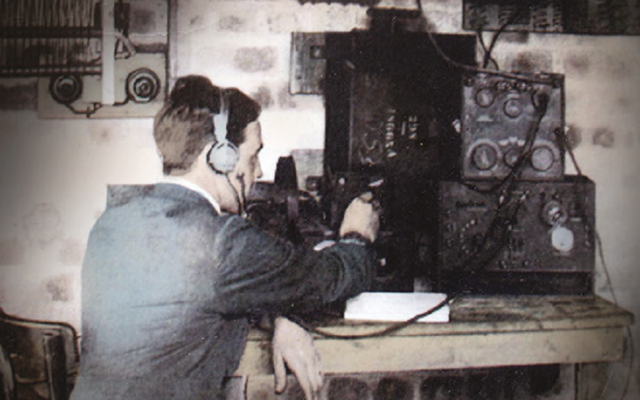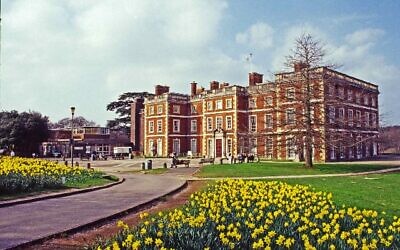Location of the ‘Secret listeners’ to launch House Of Secrets digital museum
Trent Park became the unlikely location for a group of men who eavesdroped on high-ranking German military officers who had been captured by the British forces.
Jenni Frazer is a freelance journalist

One of Britain’s most important wartime buildings, Trent Park House in Enfield, is set to launch its “House of Secrets” digital museum, in anticipation of its physical museum in 2025.
In the middle of the Second World War, Trent Park, previously owned by the Jewish millionaire Sir Philip Sassoon, became the unlikely location for a group known as the Secret Listeners. These men, mainly German Jews who had fled the Nazis, were at Trent Park to eavesdrop on high-ranking German military officers who had been captured by the British forces.
One of the Secret Listeners was Ernst Lederer, grandfather of the actress and comedian Helen Lederer, who is now a trustee of the Trent Park House of Secrets.
The German prisoners of war lived a life of comparative luxury at Trent Park, with good meals and accommodation — and even access to top-class tailors to ensure their uniforms were in the best condition. But they were unaware that they were being spied on — with a host of listening devices embedded in the walls and furniture of the mansion. Even the billiard table and trees in the gardens were bugged.
Historians believe that the “careless talk” casually flung about by the German PoWs provided crucial information to Allied intelligence.
At least one of the captives, according to historian Clive Francis, was suspicious that because of Trent Park’s previous incarnation as an interrogation centre, the building might still be bugged. General Hans-Jürgen von Arnim, captured earlier in 1943 in North Africa where he had been commander of two Panzer divisions, called a meeting of his fellow inmates on July 9 1943, warning them to indulge only in “morale-boosting conversation”.

According to Clive Francis, “Von Arnim urged his audience against handing the enemy easy propaganda opportunities. His main reason for caution was, in his mind, when Germany was gloriously victorious there would be nothing on record that as prisoners of war they might be ashamed of”.
Unfortunately for Von Arnim he was ignored by his fellow officers, not least because he had been seen having long “confidential” chats with British officers at Trent Park. As the war turned against Germany, Francis says, “the prisoners seemed to lose all sense of caution, revealing to the British their true state of mind, whether it was about Hitler, the Nazi party, war crimes or their generally distorted world view. All were secretly listened to”.
Helen Lederer’s grandfather, Ernst, was born in the Sudetenland and fled to Britain in 1939. As well as being a Secret Listener, Ernst had another role, says his granddaughter: “To mingle among the German generals to manipulate their conversations and tease out essential information. His affable personality may have come in useful when extracting information from the incarcerated generals. He was asked to assess their characters and interview them personally. The generals were encouraged by these ‘stool pigeons’ to speak freely about the war, and remarkably enough, they were most forthcoming”.
Trent Park’s digital museum and website was set to go live this week.

Thank you for helping to make Jewish News the leading source of news and opinion for the UK Jewish community. Today we're asking for your invaluable help to continue putting our community first in everything we do.
For as little as £5 a month you can help sustain the vital work we do in celebrating and standing up for Jewish life in Britain.
Jewish News holds our community together and keeps us connected. Like a synagogue, it’s where people turn to feel part of something bigger. It also proudly shows the rest of Britain the vibrancy and rich culture of modern Jewish life.
You can make a quick and easy one-off or monthly contribution of £5, £10, £20 or any other sum you’re comfortable with.
100% of your donation will help us continue celebrating our community, in all its dynamic diversity...
Engaging
Being a community platform means so much more than producing a newspaper and website. One of our proudest roles is media partnering with our invaluable charities to amplify the outstanding work they do to help us all.
Celebrating
There’s no shortage of oys in the world but Jewish News takes every opportunity to celebrate the joys too, through projects like Night of Heroes, 40 Under 40 and other compelling countdowns that make the community kvell with pride.
Pioneering
In the first collaboration between media outlets from different faiths, Jewish News worked with British Muslim TV and Church Times to produce a list of young activists leading the way on interfaith understanding.
Campaigning
Royal Mail issued a stamp honouring Holocaust hero Sir Nicholas Winton after a Jewish News campaign attracted more than 100,000 backers. Jewish Newsalso produces special editions of the paper highlighting pressing issues including mental health and Holocaust remembrance.
Easy access
In an age when news is readily accessible, Jewish News provides high-quality content free online and offline, removing any financial barriers to connecting people.
Voice of our community to wider society
The Jewish News team regularly appears on TV, radio and on the pages of the national press to comment on stories about the Jewish community. Easy access to the paper on the streets of London also means Jewish News provides an invaluable window into the community for the country at large.
We hope you agree all this is worth preserving.





















